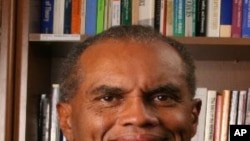Nigeria’s reputation as one of the most corrupt countries in the world is widely regarded as one of the reasons why more than half its people live in poverty. Observers say its political leaders have made it impossible for Nigeria’s vast wealth in fossil fuels to benefit Nigerians as a whole. Instead, he said, they use it to enrich themselves or their friends and family.
Richard Joseph is the John Evans Professor at Northwestern University, in Chicago, Illinois. He said Nigeria suffers from “prebendalism,” a system of governance that he said exists in many other African countries as well.
He coined the term about 30 years ago from the word “prebende” – a term that describes some early European forms of governance, including religious ones. A prebend, he said, is an elected or appointed office in which the officeholder uses its resources for personal needs.
“I adapted it to Nigeria,” said Joseph, “because…[politicians] were looking at offices they had – elected or appointed – as a way of generating revenues for themselves that they could allocate and distribute as they chose, rather than looking at the office in terms of the services to be performed and how the funds for the office would be used (to accomplish that goal).”
He said the term is still relevant to Nigeria today. “Why are the roads in such bad shape, why electric power, water production. You name it, in any area of governmental activity there has been underperformance.”
He said that when people are elected to public office, they owe allegiance not to the electorate but those in their party, tribe or clan. Joseph warns that “Nigerians need to realize that the reason they don’t have any progress in all the critical areas is because we have been so locked into that system.”
Analysts say the abuse of office and corruption are endemic in Nigeria -- to levels that they are almost tolerated by a resigned public. Nigeria always ranks low in terms of political transparency and is often a target of criticism from major donor organizations like the World Bank.
Professor Joseph said the cycle can be broken if there is a willingness on the part of the electorate to demand that those they put in public office are held accountable. But he adds that each society has to find customized solutions to its problems.
“Every country has to find a path out of that system…its own approach.” He gives the example of Scandinavian countries, where officials “will be thrown out of office for what will be considered very minimal abuses. In Kenya or Nigeria, the opposite prevails.”
He advises governments to emulate the private sector and some state governments in Nigeria that have instituted major reforms in creating more transparent systems. Adding that there is a need to make a transition to a rules-based system, so the use of government is governed by laws and accountability.




